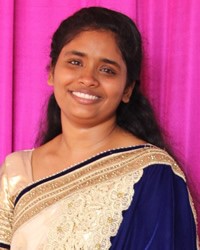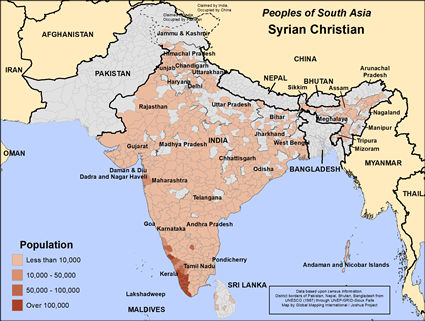Syrian Christian in India

Photo Source:
Anonymous
|

Map Source:
People Group data: Omid. Map geography: UNESCO / GMI. Map Design: Joshua Project.
|
| People Name: | Syrian Christian |
| Country: | India |
| 10/40 Window: | Yes |
| Population: | 3,759,000 |
| World Population: | 3,759,000 |
| Primary Language: | Malayalam |
| Primary Religion: | Christianity |
| Christian Adherents: | 100.00 % |
| Evangelicals: | 0.00 % |
| Scripture: | Complete Bible |
| Ministry Resources: | Yes |
| Jesus Film: | Yes |
| Audio Recordings: | Yes |
| People Cluster: | South Asia Christian |
| Affinity Bloc: | South Asian Peoples |
| Progress Level: |
|
Introduction / History
The Syrian Christians of Indian also known as Saint Thomas Syrian Christians or Nasarni are an ancient endogamous ethno-religious group found in the south western coast of India, known as Malabar in the state of Kerala. The Saint Thomas Syrian Christians belong to Syrian Christianity with churches following the East Syriac (Persian Syriac) and the West Syriac (Antiochian Syriac) liturgical rites. According to tradition Thomas the Apostle has arrived at the Malabar coast of Kerala in 52 AD, converted many upper caste Nambudiri Brahmin families and Malabar Jewish familes to Christianity and established the Ezharappallikkal (seven and a half churches), which include Palayoor, Kodungallur, North Paravur, Malayattur, Gokkamangalam, Niranam , Nilakkal and Kollam churches. The most notable among the Nambudiri Brahmin familes which were converted to Christianity by Thomas the Apostle were Pakalomattom, Sankarapuri, Kalli, Kaliyankal and Pattumukkil families. Priests were ordianed from these families. Later in 345 AD, an Assyrian Jewish merchant known as Thomas of Cana along with 400 Judeo Assyrian Christians part of the Chaldean Syrian Church of the East migrated from Mesopotamia and Iraq to Kodungallur in the Malabar coast. These Syrian Christians came to be known as Knanaya and forms an endogamous part of the Saint Thomas Syrian Christians of Kerala. These Knanaya Syrian Christians were responsible for bringing all the existing native Saint Thomas Christians of Kerala into thr Chaldean Syrian Church of the East in the 4rth century. In 825 AD two Chaldean Syrian bishops Mar Sabor and Mar Aphroth came to the ancient port of Kollam (Quilon) in Kerala along with many Assyrian Christians. The Syrian Christians of Kerala were given many privileges by the rulers of Kerala which were inscribed in ancient records like the Quilon Syrian Copper plates, Thazhekkad Shashanam order, Iravikorthan Copper plates etc. Until 1599 all Syrian Christians of Kerala were under the Chaldean Syrian Church of the East, but the Portuguese rule brought huge splits amongst the Syrian Christians of Kerala. The Portuguese had forcefully converted all Saint Thomas Syrian Christians to Latin Catholicism but they rejected the faith and half of the Syrian Christians joined the Syriac Orthodox Church of Antioch which uses the West Syriac liturgy and came to be known as Puthenkoor (literally meaning new faction as joined the Syriac Orthodox Church) and the other half joined the Catholic church as an Eastern Catholic community which uses East Syriac liturgy and came to be known as Pazhayakoor (meaning old faction as they retained their East Syriac liturgy) which form the present Syro Malabar Catholic Church and the Chaldean Syrian Church. Later in the the 18th century there occurred another split amongst the Puthenkoor Syrian Christians under the Syriac Orthodox Church of Antioch, which was due to the reformation of the Syriac Orthodox Church. The reformed faction formed the Malnakara Marthoma Syrian Church. Later there was another split where the Puthenkoor faction split into Malnakara Orthodox Syrian Church (under a native Catholicose) and the Jacobite Syriac Orthodox Church (under the Patriarch of Antioch). In the 19th century some Puthenkoor Syrian Christians joined the Catholic church as an Eastern Catholic community and came to be known as Syro Malnakara Catholic Church.
Where Are they Located?
The Saint Thomas Syrian Christians are originally from the Malabar coast of Kerala where they are concentrated in the Thrissur, Ernakulam, Idukki, Kottayam, Alappuzha, Pathanamthitta and Kollam districts. They form 70.73% of the Christians of Kerala and 12.5% of the population of Kerala.
What Are Their Lives Like?
The Syrian Christians of Kerala are a very conservative community from Kerala which is highly endogamous. They are majorly an aristocratic and trading ethnic group who are considered to be an upper caste in India in accordance with their Brahmin, Jewish and Assyrian ancestory. Until the early 20th century the Syrian Christians of Kerala practiced untouchability with the lower and middle castes of Kerala. The Saint Thomas Syrian Christians are considered a caste and they do not allow other Christians to be join them. They have the highest human developmental index among all communities of Kerala, the human developmental index is determined by land ownership, economic status and financial stability. The Syrian Christians are primarily non vegetarian and have a unique cuisine of their own. The Syrian Christians of Kerala are culturally Hindu and follow many Hindu traditions in their daily life. Their culture, cuisne, attire, artforms and traditions are derived from the native indegenous culture of Kerala.
What Are Their Beliefs?
The Saint Thomas Syrian Christian Churches are the Syro Malabar Catholic Church, Syro Malankara Catholic Church, Malankara Orthodox Syrian Church, Jacobite Syriac Orthodox Church, Malankara Marthoma Syrian Church, Malabar Independent Syrian Church and the Chaldean Syrian Church. The Syro Malabar Church and the Syro Malankara Church are Eastern Oriental Catholic Churches, the Malankara Orthodox Syrian Church, Jacobite Syriac Orthodox Church and the Malabar Independent Syrian Church are Oriental Orthodox Churches. The Malankara Marthoma Syrian Church is an reformed Oriental Orthodox Church and the Chaldean Syrian Church is a Nestorian Church.
Prayer Points
Pray that the Syrian Christians will have the gospel message given to them so that instead of being nominal Christians they become born again.
Pray for gospel materials to be given to them.